The above may take awhile to load but yes, my first book (based on most of my PhD, but not the stats) can now be read on the Internet Archive.
Category Archives: game
Galleries, Libraries, Archives, and Museums [GLAM]-focussed Games and Gamification
New book chapter out! Sorry, not open access.
Champion, E., & Emery, S. (2024). Galleries, Libraries, Archives, and Museums [GLAM]-focussed Games and Gamification. In J. Nichols & B. Mehra (Eds.), Data Curation and Information Systems Design from Australasia: Implications for Cataloguing of Vernacular Knowledge in Galleries, Libraries, Archives, and Museums (Vol. 54, pp. 67-83). Emerald Publishing Limited. https://doi.org/10.1108/S0065-283020240000054006.
Engaging with digital heritage requires understanding not only to comprehend what is simulated but also the reasons leading to its creation and curation, and how to ensure both the digital media and the significance of the cultural heritage it portrays are passed on effectively, meaningfully, and appropriately. The United Nations Educational, Scientific, and Cultural Organization defines ‘digital heritage’ to comprise of computer-based materials of enduring value some of which require active preservation strategies to maintain them for years to come.
With the proliferation of digital technologies and digital media, computer games have increasingly been seen as not only depicters of cultural heritage and platforms for virtual heritage scholarship and dissemination but also as digital cultural artefacts worthy of preservation. In this chapter, we examine how games (both digital and non-digital) can communicate cultural heritage in a galleries, libraries, archives, and museums [GLAM] setting. We also consider how they can and have been used to explore, communicate, and preserve heritage and, in particular, Indigenous heritage. Despite their apparently transient and ephemeral nature, especially compared to conventional media such as books, we argue computer games can be incorporated into active preservation approaches to digital heritage. Indeed, they may be of value to cultural heritage that needs to be not only viewed but also viscerally experienced or otherwise performed.
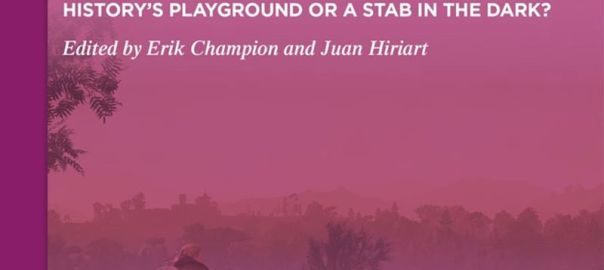
Assassin’s Creed in the Classroom
Assassin’s Creed‹ in the Classroom History’s Playground or a Stab in the Dark? HAS been published by De Gruyter, on 18 December. Thanks to my co-editor Dr Juan Hiriart, and our authors.
https://degruyter.com/document/isbn/9783111250724/html
Erik Champion and Juan Hiriart
Introduction: History’s Playground or a Stab in the Dark?
Marc-André Éthier and David Lefrançois
Chapter 1: Historical Video Games and Teaching Practices
Chu Xu, Robin Sharma and Adam K. Dubé
Chapter 2: Discovery Tour Curriculum Guides to Improve Teachers’ Adoption of Serious Gaming
Ylva Grufstedt and Robert Houghton
Chapter 3: Christian Vikings Storming Templar Castles: Anachronism as a Teaching Tool
Julien A. Bazile
Chapter 4: Ludoforming the Past: Mediation of Play and Mediation of History through Videogame Design
Nathan Looije
Chapter 5: Exploring History through Depictions of Historical Characters in Assassin’s Creed Odyssey
Juan Hiriart
Chapter 6: Empathy and Historical Learning in Assassin’s Creed Valhalla Discovery Tour
Kevin Péloquin and Marc-André Éthier
Chapter 7: The Discovery Tour as a Mediated Tool for Teaching and Learning History
Angela Schwarz
Chapter 8: Discovering the Past as a Virtual Foreign Country: Assassin’s Creed as Historical Tourism
Hamish Cameron
Chapter 9: Classical Creations in a Modern Medium: Using Story Creator Mode in a University Assignment
Kira Jones
Chapter 10: Assassin’s Creed @ The Carlos: Merging Games and Gallery in the Museum
Manuel Sánchez García and Rafael de Lacour
Chapter 11: From the Sketchbook to Assassin’s Creed Valhalla: An Experiment in Architectural Education
Erik Champion
Chapter 12: Assassin’s Creed As Immersive and Interactive Architectural History
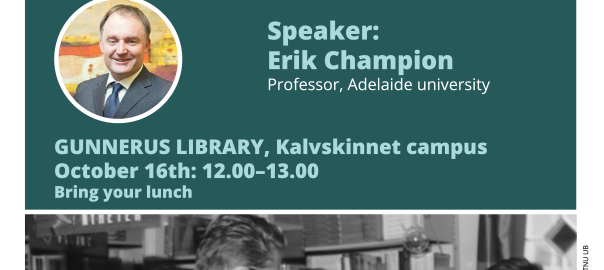
Upcoming talks: Norway Iceland UK
Thanks to echoing.eu and NTNU for inviting me to Europe.
MONDAY 16 October NTNU talk, Gunnerus Library, TRONDHEIM NORWAY 12:00-13:00
LUNCH WITH A WRITER: “PLAYING WITH THE PAST”
The eCHOing project is inviting you to a lunch lecture, join us for an exciting event that explores the fascinating world of visitor experiences in the GLAM sector (Galleries, Libraries, Archives, and Museums). Photo: gunnerus.no NTNU UB
TUESDAY 17 OCTOBER Hands-on Game Design Workshop, TRONDHEIM NORWAY, 09:30-14:30
Join us for an exciting event that explores the fascinating world of visitor experiences in the GLAM sector (Galleries, Libraries, Archives, and Museums).
Whether you’re a student curator, librarian, archivist, or museum enthusiast, this event is a must-attend to stay ahead in the ever-evolving GLAM landscape.
In this half-day workshop Erik Champion will help small groups of 4 brainstorm (“ideate”) ideas to create engaging games using a simplified working definition of computer games, and with the help of physical items. Although these game ideas could eventually become digital games, escape rooms, augmented or mixed reality projects, this introductory workshop will concentrate on creating and testing physical (analogue) demos and simple prototypes. Although Erik’s focus has been on history and heritage games, this workshop will be open to other types of games, but particularly on those where players can learn beyond the game, and where the game is a series of engaging challenges. You may bring your own idea for a game, or develop a game idea on the day in a group. No programming necessary.
- Work in interdisciplinary groups with real life problems
- Be an agent of change as your ideas will help professionals reach a wider audience for their cultural institutions!
- Learn the fundamentals of serious games and why so many fail.
- Discover how paper prototyping in groups can help you quickly create engaging game ideas.
Short bio for NTNU workshop
Erik Champion tutors game jam projects in South Australia at UniSA, and has hosted game design workshops in Australia, Italy, Poland, the United States, Qatar, and Finland, and co-hosted remotely a game design workshop with school children in Rapa Nui (Easter Island) with Dr Juan Hiriart. He is currently working on research projects with Tencent Games and Ubisoft. He wrote Playing With The Past: Into The Future (Springer 2022), and edited the open access book Virtual Heritage: A Guide (Routledge, 2021) and has written books on the intersection between video games and cultural heritage. He has honorary appointments at Curtin, UWA, and ANU and was recently a visiting professor at the University of Jyvāskylā, Finland, a partner of the Centre of Excellence in Game Studies (https://coe-gamecult.org/).
Skills required: none.
The eCHOing project is an EU-funded programme that aims to foster collaboration through open innovation between universities and 29 cultural institutions in five European countries. Don’t miss out on this unique opportunity to gain valuable insights from our invited gaming guru and writer of the book PLAYING WITH THE PAST.
WEDNESDAY 18 October MediaCity, Salford University, MANCHESTER, ENGLAND, UK, 15:00-19.00
Flexible Heritage Games, Extended Reality and Heritage Futures
My talk: Flexible Heritage Games, Extended Reality and Heritage Futures, focuses on XR and escape rooms, what can we learn from them?
Featuring four presentations as part of the Southern Je immersive exhibition.
FRIDAY 20 October, VR Lab, University of Iceland, REYKJAVIK, ICELAND, 14:00-16:00
Linking Digital Heritage, Games and Virtual Tourism: Menningararfur í sýndarheimum – Cultural Heritage in Virtual Worlds Symposium.
This talk will examine how key challenges in digital heritage involving 3D models could be brought to life and re-opened to interpretation by game design, and how game-like interaction could also help increase the richness and immersive qualities of XR (extended reality) and virtual tourism. Can 3D models, the scholarly information surrounding them, and the involvement of the public be brought closer together? And can we harness the speed and complexity of new technologies to ensure both the data and our understanding of that data can be recorded, interpreted, and shared more fairly, openly, and democratically?
Tickets: EVENTBRITE.
The other speakers will be talking on:
a) making digital twins of statues and monuments that can be used for different purposes in preservation and promotion (https://sketchfab.com/ListasafnEinars/models);
b) working with heritage and even heritage artefacts into a computer game https://islandofwinds.com
NB Morning Workshop on game prototyping: to be determined.
MONDAY 23 October Watershed Media Centre BRISTOL, ENGLAND, UK, 18:00-20:00
Screen Tourism and Affective Landscapes Book Launch

WEDNESDAY 25 October School of Journalism, Media and Culture, Central Square, CARDIFF UNIVERSITY, WALES, UK, 16:00-17:15
Reflective Experiences with Immersive Heritage (Difficult Digital Heritage)
Despite the growth and spread of digital humanities visualisation projects, parallel and accessible examples in immersive virtual heritage are harder to find. Over the last three decades, immersive technologies (especially as “new” media) have embraced digital heritage to create spectacular experiences, but existing and durable examples of virtual heritage (virtual reality applied to cultural heritage) are relatively rare, while examples of difficult heritage far rarer. In this talk I will summarize relevant dilemmas in presence research, and recent developments in virtual heritage, reflect on some difficult lessons learnt, and offer some recommendations as to how we could address the depiction or evocation of difficult pasts in the near future.
BIO
Erik Champion is an Enterprise Fellow at UniSA, Emeritus Professor at Curtin University, Honorary Research Fellow at UWA, and Honorary Research Professor at ANU. He has published books and papers on serious games and game mods, virtual heritage, virtual world phenomenology, digital humanities infrastructures, and architectural history.
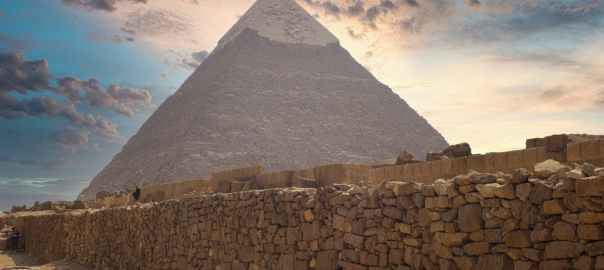
CAA2024 Session on Archaeogames
#CFP did I mention Dr Juan Hiriart and I are organizing an archaeogames session? @CAA2024AKL in Auckland New Zealand, 8-12 April? No?
Paper deadline: 19 October.
Venue: Built on the embers of my old condemned student flat.
URL: https://2024.caaconference.org/sessions/#S12
Keywords: #caa #archaeology #games #reuse #auckland #newzealand
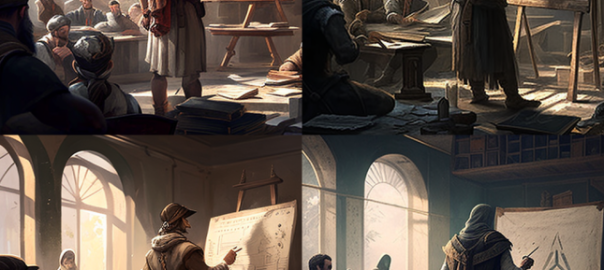
October Travels in Europe
- Monday-Tuesday 16-17 October NTNU Trondheim Norway, book launch talk (Playing With The Past: Into The Future) and workshop on cultural heritage games.
- Wednesday 18 October University of Salford, Talk/panel on games (I think, topic to be confirmed) oh and the second book launch: Assassin’s Creed in the Classroom: History’s Playground or a Stab in the Dark?
- Friday 20 October Seminar with keynote talk in Reykjavik Iceland!
- Monday 23 October talk and third book launch, Watershed Media Centre, 6-8PM. Organized by UWE Bristol UK with book launch Screen Tourism and Affective Landscapes: The Real, the Virtual, and the Cinematic!
- Wednesday 25 October talk at Cardiff, University, Wales.
I think that should be enough for awhile…
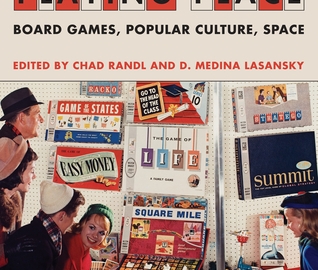
Playing Place: Board Games, Popular Culture, Space
Playing Place: Board Games, Popular Culture, Space
will be released tomorrow by MIT Press.Dr Juan Hiriart and I have a chapter in it:
Workshopping Board Games for Space Place and Culture.
Full reference:
E. Champion and J. Hiriart. Workshopping Board Games for Space Place and Culture. In: Playing Place: Board Games, Popular Culture, Space, edited by C. Randl and D. M. Lasansky. MIT Press 2023. ISBN: 9780262047838.

Norway in October
Have been invited to the Norwegian University of Science and Technology – NTNU in Trondheim to give a talk and possibly a workshop for echoing.eu (“Recovery of cultural heritage through higher education-driven open innovation”).
And it looks like I may have funds for a book launch in Bristol, a talk at Salford University (near Manchester) and a talk at Cardiff University in Wales. Still to fully organize the UK side trip though.
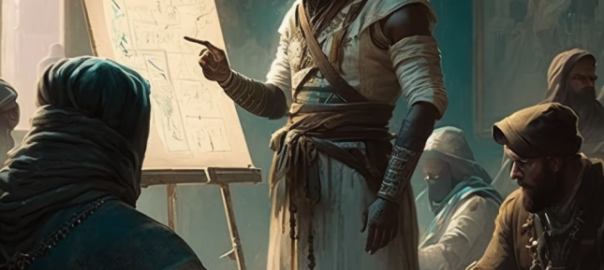
Update: book contract signed!
Assassin’s Creed in the Classroom: History’s Playground or A Stab in the Dark, an edited book with co-editor Juan Hiriart, is in process, contract sent/signed with De Gruyter…
Image Credit: Midjourney.
New book, new cover?
Champion, E., & Hiriart, J. (Eds.). (2023: accepted). Assassin’s Creed in the Classroom: History’s Playground or a Stab in the Dark? De Gruyter: Video games and the Humanities series.
It looks like the “Assassin’s Creed in the Classroom: History’s Playground or a Stab in the Dark?” edited book is close to the contract stage, and hopefully will be published by the end of the year…what sort of cover image do you suggest? For De Gruyter’s “Video Games and the Humanities” series (must suit their theme colour):

PhD Opportunity: Audio-Augmented Reality
PhD study opportunity* at the University of South Australia (in Adelaide, South Australia) https://unisa.edu.au/research/degrees/leveraging-audio-augmented-reality
“lead tourists around past & present live music hotspots & live music history locations of Adelaide with directed thematic or user-driven audio tours”
*Sorry, there are no degree fees for locals but there is also no scholarship funding attached to this one.

Playing with the Past: Into the Future
I believe my latest book (well second edition) is out today, “Playing with the Past: Into the Future” (in the Human–Computer Interaction Series) https://link.springer.com/book/10.1007/978-3-031-10932-4 but it just takes to me to my own university library link so I’ll have to take my own word for it!
Since the turn of this century (and even earlier), a plethora of projects have arisen to promise us bold new interactive adventures and immersive travel into the past with digital environments (using mixed, virtual or augmented reality, as well as computer games). In Playing with the Past: Into the Future Erik Champion surveys past attempts to communicate history and heritage through virtual environments and suggests new technology and creative ideas for more engaging and educational games and virtual learning environments.
This second edition builds on and updates the first edition with new game discussions, surveys, design frameworks, and theories on how cultural heritage could be experienced in digital worlds, via museums, mobile phones, or the Metaverse. Recent games and learning environments are reviewed, with provocative discussion of new and emerging promises and challenges.
Playing with the past: INTO The Future (2023)

Out in print oh so soon
Books
Playing with the Past: Into the Future (second edition, ebook out soon)
Screen Tourism and Affective Landscapes: The Real, the Virtual, and the Cinematic-I’m a co-editor but have a chapter on videogame tourism in there somewhere..
Book Chapters
- Champion, E. (2022). Reflective Experiences with Immersive Heritage: A Theoretical Design-Based Framework. In A. Benardou & A. M. Droumpouki (Eds.), Difficult Pasts and Immersive Experiences (pp. 23-40). Routledge. https://doi.org/10.4324/9781003200659
- Champion, E., Nurmikko-Fuller, T., & Grant, K. (2022). Alchemy and Archives, Swords, Spells, and Castles: Medieval-modding Skyrim. In R. Houghton (Ed.), Teaching the Middle Ages through Modern Games (pp. 175-200). De Gruyter Oldenbourg. https://doi.org/doi:10.1515/9783110712032
Working on now/sent
- Champion, E., Stadler, J., Lee, C., & Peaslee, R. (Eds.). (2023: In press). Screen Tourism and Affective Landscapes: the Real, the Virtual, and the Cinematic. Routledge. https://www.routledge.com/Screen-Tourism-and-Affective-Landscapes-The-Real-the-Virtual-and-the/Champion-Lee-Stadler-Peaslee/p/book/9781032355962.
- Champion, E., & Hiriart, J. (2023: In press). Workshopping Board Games for Space Place and Culture. In C. Randl & D. M. Lasansky (Eds.), Playing Place: Board Games, Popular Culture, Space. MIT Press. 08/2023.
- Champion, E. M. (2023: In press). Digital Heritage Ethics. In A. Pantazatos, T. Ireland, J. Schofield, & R. Zhang (Eds.), The Routledge Handbook of Heritage Ethics. Routledge.
- Champion, E., & Emery, S. (2023: Pending). Gamification of Cultural Heritage as a resource for the GLAM sector. In J. Nichols & B. Mehra (Eds.), Data Curation and Information Systems Design from Australasia: Implications for Cataloguing of Indigenous Knowledge in Galleries, Libraries, Archives and Museums. Routledge.
- Champion, E. (2022: In press). Not Quite Virtual: Techné between Text and World. In B. Mauer & A. Salter (Eds.), Reimagining the Humanities. Parlor Press.
Conference paper
- Champion, E., & McCallum, S. (2022, 20-23 November 2022). Game Design Prototyping Workshop: Brainstorming and Designing Collaborative and Creative Game Prototypes with Immersive Surfaces ACM ISS 2022, Wellington, New Zealand. https://dl.acm.org/doi/10.1145/3532104.3571472

Game Design Prototyping Workshop
Prototyping games in a workshop format..just published a short paper on a “Game Design Prototyping Workshop” with Simon McCallum in Wellington NZ @ACM_ISS 2022 (also trying out Kudos, in partnership with ACM) https://www.growkudos.com/publications/10.1145%25252F3532104.3571472/reader
Game Design Prototyping Workshop, November 2022, ACM (Association for Computing Machinery), DOI: 10.1145/3532104.3571472.
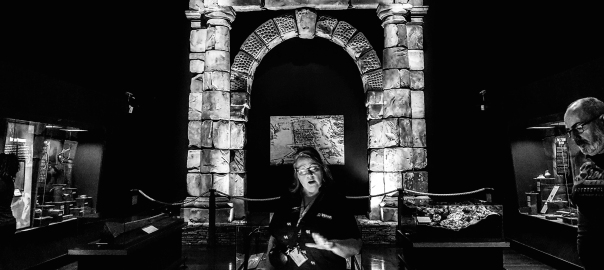
book chapter out: Reflective Experiences with Immersive Heritage
Google told me I can buy my chapter today in this book out soon “Difficult Heritage and Immersive Experiences” my chapter is “Chapter 2. Reflective Experiences with Immersive Heritage” #chapter #difficultheritage #darkheritage
In this chapter I will examine difficult and dark heritage. Others have articulated the overlap and potential different connotations and spheres of influence of dark heritage and difficult heritage (Thomas et al. 2019). For the sake of expediency, I will not attempt to distinguish between difficult heritage and dark heritage (a term imported from dark tourism) as I am particularly interested in the difficult interaction aspects of communicating dark heritage due to the technical challenges of virtual heritage, gaps or immaturity in virtual heritage as a distinct scholarly field, and the still to be fully explored role and impact of virtual heritage as an immersive and interactive medium capable of coaxing, encouraging and affording reflectivity.
PhD Project Call, no fees
PHD project in Adelaide, no scholarship but no fees, with cool museum partner (https://mod.org.au):
The successful candidate will investigate and design learning kits for museums, communities and small classes to create escape rooms either physical or hybrid, or via a game engine. The kit will provide resources and interaction strategies to help budding escape room designers plan escape rooms for their compatriots, and in doing so learn for themselves how to create tricky interactive puzzles, quizzes and physical riddles based on principles in science, mathematics or history. The instructions will be either via virtual examples through a game engine or game engine exporting to VR, or via online instruction videos using the latest instructional video expertise.
Successful completion of the project will provide you with experience in boardgame, physical escape room, digital game or VR escape room design including scripting, prototyping, digital modelling, and potentially animation experience. As well as a background in human-computer interaction and education. Thus, you will be provided with the skills for a successful and exciting research or industry career in a diverse range of areas.
What you’ll do
In this project-based research degree, you will review, design and evaluate design resources (physical and digital) for the creation of escape rooms by design students.
You will engage and partner with MOD. staff and deploy IVE, VR and AR equipment, as well as run and evaluate escape room design workshops.
Where you’ll be based
You will be based at UniSA Creative, incorporating the South Australian School of Art, which brings together the disciplines of architecture, planning, art and design, journalism, communication and media, film and television and the creative industries to produce flexible graduates with multidisciplinary capabilities. Our research explores the complexities of the world around us. We engage in future-focused, cross-disciplinary research and consultancy to produce inspired solutions that are human-centred and sustainable.
https://www.unisa.edu.au/research/degrees/designing-an-escape-room-toolkit
Game Prototyping Workshop in NZ
I am hosting the Workshop on Game Design Prototyping at ACM ISS (Interactive Surfaces and Spaces) conference, 20 November 2022, with Simon McCallum, Wellington, NZ.
This workshop will take place over half a day and focus on tools and example projects that break down necessary and sufficient elements of effective game design, tips to create and encourage small group design ideas, and potential environmental challenges that can be overcome or at least approached with low-cost and accessible tools and platforms. We will focus on physical prototypes but can also examine games using game engines or specific XR formats but we don’t expect to have HMDs available.
Call for Participation
This workshop will take place over half a day and focus on tools and example projects that break down necessary and sufficient elements of effective game design, tips to create and encourage small group design ideas, and potential environmental challenges that can be overcome or at least approached with low-cost and accessible tools and platforms. We will focus on physical prototypes but can also examine games using game engines or specific XR formats but we don’t expect to have HMDs available.
We will work in groups of 3 and 4 on provided game challenges, ideas developed by individual groups or we can (with enough notice) work on improving and game-testing ideas and prototypes provided by attendees.
The proposed schedule will be:
| Section | Minutes |
|---|---|
| 1. Introductions for all | 20 |
| 2. Overview: games, gamification | 20 |
| 3. Discussion of technologies, methods + prototyping | 10 |
| 4. Group suggests ideas. | 10 |
| 5. Short break/questions. | 20 |
| 6. Selection of teams | 10 |
| 7. Work on game ideas as prototypes, and playtest solutions. | 90 |
| 8. Present prototypes/suggestions in class. | 30 |
TOTAL HOURS: 3.5
Outcomes
Ideally, by the end of the workshop, the participants will:
- Provide (at some stage of the experience), a framework in which the player (or perhaps, here, participant is a better word) gains an overview of what has been documented, simulated, or construed.
- Convey a sense of the historical context, and the way in which that shaped the actions of the inhabitants.
- Affordances to help participants understand and explain the information in a way that suits them rather than the designer and to allow for different pathways, actions and goal selection.
- Encourage the participants to seek out more information for themselves beyond the immediate simulation.
Organizers
Enterprise Fellow Erik Champion, has organized game design workshops in Australia, Italy, Poland, Qatar, Finland, and USA. He specializes in virtual heritage and serious games for history and heritage.
Simon McCallum is a games expert and has over 25 years experience having taught games in New Zealand and Norway. Simon has also spent some time working for games companies in Norway. Simon helped setup the NZ Games Development Conference in the early – mid 2000s.
Face to Face Attendance
This workshop will be physical but the first 45 minutes (introductions and background to tools and techniques) could be accessible online if required. Ideally, the workshop will be 12 to 20 people.
Contact
Please contact Erik.Champion@unisa.edu.au for further information about submissions.
Registration
To register to attend the workshop please see the ACM ISS Registration Information.
Screen Tourism and Affective Landscapes
If anyone would like a review/inspection copy of the edited book “Screen Tourism and Affective Landscapes: The Real, the Virtual, and the Cinematic” (out 30.12.2022, cover to come) there is a link on the webpage.
- Introduction
- Screen Tourism: Marketing the Moods and Myths of Magic Places
- Windshield Tourism Goes Viral: On YouTube Scenic Drive Videos of U.S. National Parks
- “Forever Bali”: Surf Tourism and Morning of the Earth (1972)
- Locating Fellini: Affect, Cinecittà, and the Cinematic Pilgrimage
- Walking in Cary Grant’s footsteps: the Looking for Archie walking tour
- Vancouver Unmoored: Hollywood North as a Site of Spectres
- Always The Desert – Creating Affective Landscapes Through Visual Storytelling In Breaking Bad
- Nordic Noir and miserable landscape tourism
- Serial Killer Cinema and Dark Tourism: The Affective Contours of Genre and Place
- Down the Rabbit Hole: Disneyland Gangs, Affective Spaces, and Covid-19
- Immersive Worlds and Sites of Participatory Culture: The Evolution of Screen Tourism and Theme Parks
- Hobbiton 2.0, 20 years on: Authenticity and Immersive Themed Space
- Swords, Sandals, and Selfies: Videogame-induced Tourism
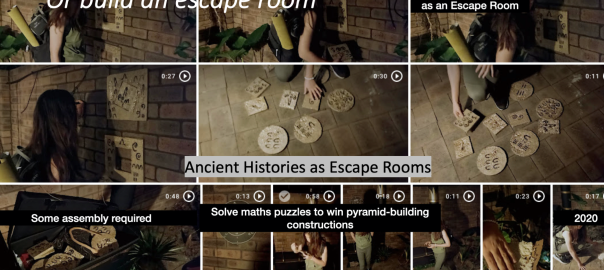
Escape Room Archaeology
Next project: edited collected chapters (free online): DIY archaeology (history, architectural/art history and heritage) escape rooms children/students can create at home or in class (written and illustrated like cookbook recipes). Now, just how to write up the proposal & find the right designers, writers, & experts!

Assassin’s Creed in the Classroom: History’s Playground or a Stab in the Dark?
I am very close to submitting to a publisher the edited book (with Dr Juan Hiriart, University of Salford, UK) “Assassin’s Creed in the Classroom: History’s Playground or a Stab in the Dark?” with 18 writers from history, archaeology, architecture, art history, classics, game design, and education. Thanks to Maxime Durand and Ubisoft for helping getting the party started.